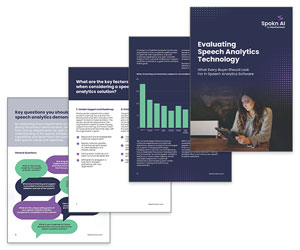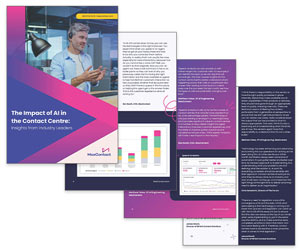For the last two years the contact centre industry, like every other, has been focused on coping with an unprecedented crisis.
It began with a hectic period of fire fighting, and by the end of 2020 no one had enough energy or headspace to look up and scan the horizon. The close of 2021 feels different.
Cautiously, people are beginning to wonder what the new normal will look like going forward.
In the contact centre industry there are some big questions that wouldn’t have been asked without the pandemic, and others which were coming down the track anyway and are starting to loom large again.
Here are some of the industry trends for 2022 and beyond, covering teams and agents, business and customers.
Teams and Agents
- Perhaps the biggest single question about the post pandemic future is whether there will be an end to home working and a return to the office. Contact centre leaders and managers understandably want to know what effect home working has on productivity.
And to be fair, the research evidence so far is mixed, with some studies saying productivity goes up, while others say the opposite. What is clear is that employees want to continue hybrid working, with 82% of UK staff in one study saying they want to work at least one day per week from home.
But given the uncertainty and conflicting demands, some leaders may fall back on the pre-pandemic default and get everyone back in the office.
- Automation is often characterised as a job destroyer, but in the contact centre industry it could become a job enhancer. AI can be a helper for the agent, filling in knowledge gaps, and ultimately letting them take on and resolve more complex issues.
It also strips out repetitive, mundane tasks from the role.
This will lead to greater job satisfaction and therefore better staff retention. To reach these positive outcomes, though, the focus must be on people rather than solely on cost cutting. Agents have to be seen as skilled staff to be developed, and automation has to deliver an enhanced experience for the customer.
Business
- Over the last 18 months industry leaders have been focused on the day-to-day challenges of getting through the pandemic. Now that we are beginning to come out the other side, the same imperatives for change that were driving the industry in late 2019 are being felt again.
One of the most powerful of these drivers is the adoption of cloud-based technology.
As the pandemic has demonstrated, businesses have to be adaptive and agile, and cloud-based solutions provide the flexibility and timely access to modern features that businesses need to stay competitive.
Cloud-based contact centres are predicted to become mainstream in less than two years, with late-adopters at risk of being left behind.
- It’s being called The Great Resignation, and Harvard Business Review describes it as a tidal wave of people quitting their jobs. Recruitment and staff retention in the contact centre industry has always been tough, and it’s not going to get any easier as people reconsider their priorities.
The industry will have to work even harder to find and keep good people. One tool in the box for staff retention is job satisfaction, and there is evidence that allowing agents some measure of choice over hybrid working can increase job satisfaction and boost productivity.
It’s being given the choice that produces the benefits, though, as much as home working itself. Someone might choose to come into the office five days per week as they’ve always done, but still have an increase in job satisfaction.
Customers
- Proactive customer engagement means that the organisation initiates contact with a customer, either to pass on information about a potential issue before it happens, or to offer new products and features.
This is in contrast to traditional, reactive customer engagement, in which an unhappy customer is left to find and navigate the best contact channel for themselves.
Being proactive works, but even so, according to one recent survey of 6000 companies, only 13% reported that they were using any proactive engagement at all. That’s a shame, because it can lead to increases in net promoter scores and customer satisfaction.
This is a slow burning trend that will keep growing, because the things that drive it – data insight and management – will continue getting more powerful and widespread.
Facing forward
If the last two years have taught us anything, it’s that nothing is certain. The best planning in the world can still be blindsided by a black swan event.
But whether we are talking about extraordinary situations or everyday operations, businesses need the same things to succeed.
They need to be agile, have good data to base decisions on, get the best from their staff, and build great partnerships.
For more information about MaxContact - visit the MaxContact Website
Call Centre Helper is not responsible for the content of these guest blog posts. The opinions expressed in this article are those of the author, and do not necessarily reflect those of Call Centre Helper.
Author: MaxContact
Published On: 14th Dec 2021
Read more about - Guest Blogs, MaxContact






 MaxContact is customer engagement software that goes above and beyond to build smarter customer experiences. Our platform is packed with powerful features, accessible for businesses large and small, and ensures organisations can operate compliantly.
MaxContact is customer engagement software that goes above and beyond to build smarter customer experiences. Our platform is packed with powerful features, accessible for businesses large and small, and ensures organisations can operate compliantly. 











